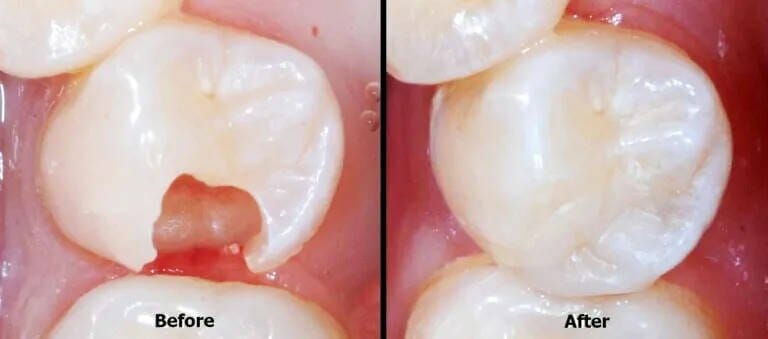Dental fillings restore voids left by the removal of tooth decay. Tooth decay, “dental caries” or formation of “a cavity” are all terms for a process by which bacteria digest sugar residues in the mouth, producing by-product acids that soften your enamel. If your Kitchener Dentist detects the cavity early on, treatment will involve removal of decay affecting only a small portion of your tooth. Then, the Dentist repairs the area with a dental filling.
In advanced cases, large cavities or holes may be present and will require large or deep fillings. In cases of deep decay approximating the nerve canal space, root canal therapy may be required in conjunction with placement of a dental filling.
Unfortunately, most cases of dental decay do not produce discernible pain, sensitivity or other symptoms. In fact, most cases of deep decay go unnoticed by patients because of a lack of symptoms. Tooth decay can be orange, brown, black or purple in appearance. Importantly, the presence of a distinguishable colour change must be accompanied by a detectable softening of the tooth structure or change in consistency. Sometimes, where symptoms are present, dental decay may manifest as an increase in sensitivity to sweet or cold stimuli. If you notice a colour change on a surface of your tooth or experience a localized increase in tooth sensitivity, it is best to have it assessed by us.
Even if no decay is present, there is the value to having that knowledge and the piece-of-mind in knowing that your teeth are healthy. Dr. Hornby will check your teeth at recall or “check-up” appointments and at cleanings. If decay is present, we will often take a photograph to review with you. From there, you can book an appointment during a time convenient to you so that we can treat and restore your tooth/teeth.

Book a consult to discuss Dental Fillings with Dr. Kyle Hornby now. Call at (519)-576-8160 Or Schedule Your Appointment Online.
Step-by-step placement of a Composite Filling.

At your dental filling appointment, Dr. Hornby will review the procedure thoroughly with you. Any relevant radiographs and intraoral photographs that demonstrate dental decay will be reviewed with you as well. Our aim is to be as transparent with you as we can be. The majority of patients opt for and receive local anesthetic to “numb” the affected teeth. A small percentage of patients prefer to avoid the use of local anesthetic as a personal preference. Topical anesthetic or “numbing gel” is held in contact with the gums for 30-60 seconds. Local anesthetic will then be administered at a site directly adjacent to the affected tooth. Full anesthesia is typically achieved following a 5-10 minute wait. Dental decay will be removed using a special abrasive bur that is powered by a dental handpiece. Once all decayed tooth structure is removed, a series of sterilizing and priming solutions will be applied to your tooth to facilitate bonding of a tooth-coloured filling material within the excavated site. The tooth-coloured filling material will be properly adapted and contoured to seal the void left by cavity preparation and provide you with what looks and feels like real tooth structure! The dental filling will be light-cured and hardened using a blue light. The final steps involve shaping and fine polishing of your dental filling. Dr. Hornby will ensure that your bite is comfortable and then take a post-operative photograph to show you your smooth and glossy new dental filling.
Dental Fillings Kitchener: What is a Dental Filling Made Of?
Dental fillings are generally of 2 kinds. The first kind is an amalgam filling and these were the most common filling type 25-30 years ago. Although scientifically proven to be safe, individual concerns about mercury in amalgam fillings has caused a decline in use. Nowadays, most fillings are made of tooth-coloured composite resin. Most patients prefer the appearance of these fillings as they can be placed to precisely match your natural tooth colour.
Dental Fillings Kitchener: Do Fillings Hurt?
No. Placement of dental fillings should not hurt. Treatment of dental decay or “cavities” is typically completed with use of a local anesthetic to provide numbness or “freezing”. Post-operatively (see below), patients may experience short-lived temperature or biting sensitivity for 1-2 weeks following placement of dental fillings. The sensitivity gradually subsides over this post-operative period and is indicative of healing in your tooth’s nerve. If you are experiencing post-operative sensitivity beyond 1-2 weeks, or if you are experiencing outright pain, call us to notify us.
Dental Fillings Kitchener: How Long do Fillings Last?
Dental fillings vary in longevity depending on the material. Their longevity also varies depending on where they exist on the tooth. Generally, silver-amalgam fillings can last 20 - 40 years. In comparison, white composite fillings can last 5 - 15 years.
White composite fillings last longer if they are bonded to enamel. Enamel is the white material that makes up the crown of your tooth. Sometimes, patients experience gum recession and this exposes the outer surface of their tooth root. The root is cavity-prone because it's not protected by any enamel.
The other downside to root cavities is that white fillings don't last as long on root surfaces. Typically, these fillings may last only 4-5 years before requiring replacement or maintenance.
Post-operatively, you will be advised to avoid eating and drinking for 1-2 hours depending on the volume and concentration of dental anesthetic used. This ensures that you do not inadvertently bite or chew your lip or cheek and sustain painful soft tissue trauma. You may also experience intermittent pressure- or cold-induced sensitivity for a period of 1-2 weeks following placement of your dental filling(s). The amount of time taken for this sensitivity to subside will typically depend upon the depth of the repaired decay or its proximity to the dental pulp or “nerve”. If you are not sure whether or not the symptoms you are experiencing are normal, call your Kitchener Dentist to let them know.
Patients often ask us if they should replace their older silver fillings. They ask us "do mercury-containing fillings cause health problems?" Many have heard opinions about superior safety of white composite resin fillings.
So, what does the best current research show?
Well, it's important to note that the alternative to mercury-containing amalgam fillings, white composite resin, releases chemicals over time as well. Many studies show that chemicals released from tooth-coloured composite fillings can be toxic to your body's cells. In fact, some of these chemicals can adversely affect enzymes that regulate different processes in your body including how your cells divide and multiply as you grow.
Now, some research links mercury to Alzheimer's and certain forms of Cancer. However, the majority of research on amalgam filling toxicity shows that the amount of mercury released from these fillings on a daily basis can be safely detoxified through your liver.
It's important to keep in mind that some dental patients have far more mercury-containing fillings than others. These patients deal with a much higher mercury burden on a daily basis. So, your Dentist should take this into consideration when recommending dental materials for restorative work.
Also, mercury-containing fillings can produce galvanic effects when in contact with other metals such as those found in metal braces for Orthodontic treatment. The galvanic effect that this contact produces can speed the surface release of mercury from silver fillings.
The Canadian Dental Association has a useful FAQ article on mercury exposure in dental fillings here.
It's most important to be aware that white composite resin fillings also release chemicals into your saliva on a daily basis. Also, the removal of mercury-containing fillings can produce particles and vapors that increase exposure. Even if your Dentist guarantees maximum safety and no-exposure-removal, this is impossible to confirm and therefore, guarantee.
So, how much does a dental filling cost? Dental filling costs vary. The two factors determining cost are the type of tooth receiving treatment (i.e. incisor, canine, premolar, molar) and the number of surfaces or walls being repaired. Some cavities are limited to a tooth’s biting/chewing surface. This is a one-surface filling. Sometimes a patient fractures a side-wall including the chewing surface. So, this would be a two-surface filling.
Based on those two pieces of information, you then refer to a fixed price code in the Ontario Dental Association Fee Guide. Generally, most fillings fall within a $150 – $400 range. We recommend you consult your dentist for a cost estimate on treatment.
Schedule an Appointment Now
Service
Routine Dentistry & Tooth Repair
Oral Surgery & Tooth Removal
Prosthetic Dentistry & Tooth Replacement
Protective/Preventive Services
Teeth Whitening

OFFICE HOURS